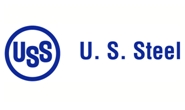Market Segment

August 2, 2018
U.S. Steel CEO: President Won’t Blink on Tariffs
Written by Sandy Williams
“We’ve earned the right to grow,” said U.S. Steel Corp. CEO David Burritt during the company’s second-quarter 2018 earnings call. U.S. Steel showed its strength in the second quarter with net sales of $3.6 billion and net earnings of $214 million. Adjusted EBITDA rose from $376 million to $451 million year-over-year.
U.S. Steel said its $2 billion asset revitalization program is progressing well. The Granite City B furnace was restarted ahead of schedule in the second quarter and produced 30,000 tons in June. Production for July is expected to ramp up to 100,000 tons. The A furnace is expected to be operational in October. A 52-day blast furnace outage is scheduled for August at Great Lakes Works.
Steel shipments in the second quarter totaled 3.9 million tons: 2.58 million tons of flat rolled, 1.15 million tons by U.S. Steel Europe, and 201,000 tons in the tubular steel segment. Average price for flat rolled steel in the quarter was $819 per ton, up from $742 per ton a year ago.
Raw steel production in the U.S. segment totaled 2.84 million tons and capacity utilization for the flat rolled segment averaged 67 percent.
Looking ahead, U.S. steel is expecting a positive market for the third quarter. Flat-rolled segment results will benefit from higher prices in contract and spot shipments. About 75 percent of its flat rolled contracts will be up for renewal in January and the remaining in April.
The fourth quarter will be the first time in 2018 that U.S. Steel will have its full portfolio of blast furnaces running. No U.S. outages are planned for the fourth quarter.
The tubular segment reported an adjusted EBITDA loss of $23 million from increased substrate costs, but is expected to be profitable beginning in the third quarter.
U.S. Steel forecasts Q3 adjusted EBITDA to be approximately $525 million, lower than expected due to seasonal outages in Europe. The company increased its full year 2018 adjusted EBITDA to $1.85 billion to $1.90 billion.
During the earnings call, Burritt emphasized that U.S. Steel is “open for business and ready, willing and able to make and ship and sell hot rolled, cold rolled, corrosion resistant, tin mill products, tubular and slab. Contrary to the false information spread by those who import slabs quoted in the media, we have offered and remain willing and able to sell significant volumes of merchant slab in the U.S. and at market prices,” he said.
Regarding contract labor negotiations, Burritt said meetings have been held with the USW and there is a “good meeting of minds on the kind of things we have to look at.” He added that he is comfortable with where negotiations currently are and that the parties will continue to work through them without much disruption.
Labor negotiations will impact another area of interest at U.S. steel—the Fairfield EAF. Burritt said there are a number of stage gates to get through before the EAF will be be completed, including sustainable EBITDA and a separate labor agreement for the tubular business. “We need to make sure that the folks working at Tubular are aligned with the business and its performance, just like we need to have the North American Flat-Rolled aligned with this business,” said Burritt. “You can’t have kind of one big agreement that everybody goes to because it dilutes the performance of one organization over another. And I think we need to make progress on that in order to turn on the electric arc furnace.”
Burritt added, “But we have about $150 million left to spend, 20 to 24 months to complete it and we’re ready to go as soon as we get through the stage gate.”
When asked how EU safeguards on steel will impact the company, Burritt said the impact will be minimal because of the limited business by U.S. Steel between the EU and U.S. “The EU caring about free trade and their market is probably good for everybody, just like it is here,” he added.
Burritt said U.S. Steel had an “incredibly exciting” visit from President Trump and that the commitment the president has to steel is “unprecedented.”
“This trade situation requires a lot of courage. We have courageous leadership now invested in this rather than kicking the can down the road as happened for so many years. And here we are, finally seeing it take hold. We don’t expect the president to blink.”







